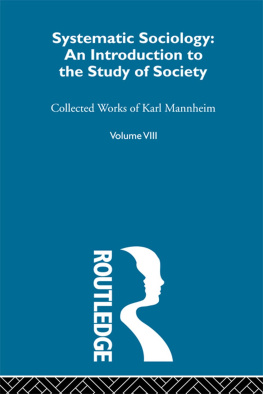AN INTRODUCTION TO THE SOCIOLOGY OF EDUCATION
The Sociology of Karl Mannheim
K. Mannheim (1935) Ideology and Utopia: an Introduction to the Sociology of Knowledge. London: Routiedge & Kegan Paul (new edition 1991).
K. Mannheim (1940) Man and Society in an Age of Reconstruction. London: Kegan Paul, Trench, Trubner.
K. Mannheim (1943) Diagnosis of our Time: Wartime Essays of a Sociologist. Kegan Paul, Trench, Trubner.
K. Mannheim (1951) Freedom, Power and Democratic Planning. London: Routiedge & Kegan Paul.
K. Mannheim (1952) Essays on the Sociology of Knowledge. London: Routiedge & Kegan Paul.
K. Mannheim (1953) Essays on Sociology and Social Psychology. London: Routiedge & Kegan Paul.
K. Mannheim (1956) Essays on the Sociology of Culture. London: Routiedge & Kegan Paul (new edition 1992).
K. Mannheim (1957) Systematic Sociology. London: Routiedge & Kegan Paul.
K. Mannheim and W. A. C. Stewart (1962) An Introduction to the Sociology of Education. London: Routiedge & Kegan Paul.
K. Mannheim (1982) Structures of Thinking. London: Routiedge & Kegan Paul.
K. Mannheim (1986) Conservatism: A Contribution to the Sociology of Knowledge. London: Routiedge and Kegan Paul.

First published 1962
by Routledge
Reprinted 1997
by Routledge
2 Park Square, Milton Park, Abingdon, Oxon, OX14 4RN
Simultaneously published in the USA and Canada
by Routledge
270 Madison Ave, New York NY 10016
First issued in paperback 2010
Karl Mannheim and W. A. C. Stewart 1962
All rights reserved. No part of this book may be reprinted or reproduced or utilized in any form or by any electronic, mechanical, or other means, now known or hereafter invented, including photocopying and recording, or in any information storage or retrieval system, without permission in writing from the publishers.
Publishers Note
These reprints are taken from original copies of each book. In many cases the condition of these originals is not perfect, the paper, often handmade, having suffered over time, and the copy from such factors as inconsistent printing pressure resulting in faint text, show-through from one side of a leaf to the other, the filling in of some characters, and the break-up of type. The publisher has gone to great lengths to ensure the quality of these reprints, but wishes to point out that certain characteristics of the original copies will, of necessity, be apparent in reprints thereof.
British Library Cataloguing in Publication Data
A catalogue record for this book is available from the British Library
Library of Congress Cataloguing in Publication Data
A catalogue record for this book has been requested
ISBN 9780415150859 (hbk)
ISBN 9780415604451 (pbk)
ISBN 9781134552184 (ebk)
ISBN 9780415144483 (set)
I
T HIS is the last of the posthumous volumes of Karl Mann- heims work and now that five earlier volumes have appeared since his death in 1947, we can put them together with the books published in his lifetime and realize the grand scale on which he worked. Any book on education would refer only to a part of Mannheims preoccupations, although, characteristically as we shall see, education in his hands develops a pretty grand scale of its own. So it is appropriate that this book should appear last in the canon.
A second apt reason for this book coming at the end is that, although education was throughout his writings a dominant theme, the material on which this book is based is probably more incomplete and more fragmentary than the sources on which all other volumes were based. The main reasons for this are not far to seek. Since 1940 Mannheim had lectured on a part-time basis at the University of London Institute of Education, while continuing his main work as a sociologist at the London School of Economics. In 1946 he was appointed to a Chair of Education at the Institute of Education, which he held for only a year. Thus, while he had always been engaged in and by the issues of education, and for a few years had read, as his enormous bibliographies testify, with characteristic industry and eclecticism in what the Americans call the area, the concentration of thought in his post as Professor of Education was tragically short. In 1946 he had a field of study rich in possibilities and virtually unexplored in this country where his discernment and ability for synthesis would have found scope.
There is a didactic element in Mannheims later writing points out that his message or policy begins and ends with a concern for the transformation of modern man, and this is borne out by a passage taken from the last chapter of this book:
(In the study of the sociological foundations of education) we are in search of something which should never be lost sight of in our research. We want to understand our time, the predicament of this age and what healthy education could contribute to a regeneration of society and man. In this quest for orientation sociology is a tool and we shall use it in a two-fold sense as a special theory of educa- tion and as a new approach to its history.
He maintains that there are no limits which can be laid down for this by philosophic discussion, but that these will appear as a result of sociological research. However, most of his educational thinking seems to proceed from the application of general principles and not from field work as an inquirer, but this is true of his grand manner sociology as a whole. An American writer goes so far as to say that Mannheim is not a sociologist, but a political theorist whose work deals more with the humanistic foundations of education than with the be- havioural sciences, for it is quite inadequate from the point of view of experimental sociology. It is true that in one voice Mannheim says that by sociological inquiry we must find out what are the facts, and in another what ought to be done in order to produce certain results. Education is an activity peculiarly suited to this kind of treatment, for by definition it is deliberate, purposeful and concerned in some way with aims. Yet it also is especially open to experimentation, fact-finding and assessment.
Without in any way wishing to let loose the hungry hunters who range about seeking what they may devour in the search for a valid methodology or a means of verification in the social sciences, I would point out that education is concerned with people, learning, institutions, knowledge, evaluation. Experimental sociology lets the light strike on it all from one angle, psychology from another, philosophy and history from yet others. Education is a marvellously rich quarry from which to hew academic nuggets, and some of the deposits are so complex that the various prospectors do not yet know how to examine them. At the risk of being cloven by a sociological spade or a psychological pick, I would say that if ever any study was inter-disciplinary it is education. It is liable to serious distortion if any particular scholar gets his magnifying glass on just a part of it.
Mannheim was asking questions which led more and more to synthetic rather than to exclusive and analytic types of thinking. Let us for a moment look at some of these. Individuals live in groups. In what senses has each a unique personality and how is this formed? The human being who knows and what he knows and the act of knowing present problems which have concerned philosophers, psychologists and sociolo- gists since the beginning of time. In what ways is a person free, or limited, or conditioned in his knowing? If we try to place these questions within a particular historical context we have to face the problems of social structure, social control and social change, as well as more generalized philosophic issues. Such themes as these lead to synthetic rather than exclusive types of thinking.





